
Rani Mukerji: Empress of emotions
Actor Rani Mukerji has connected with the audience for more than two decades by channeling her own sensitivity into the characters she plays
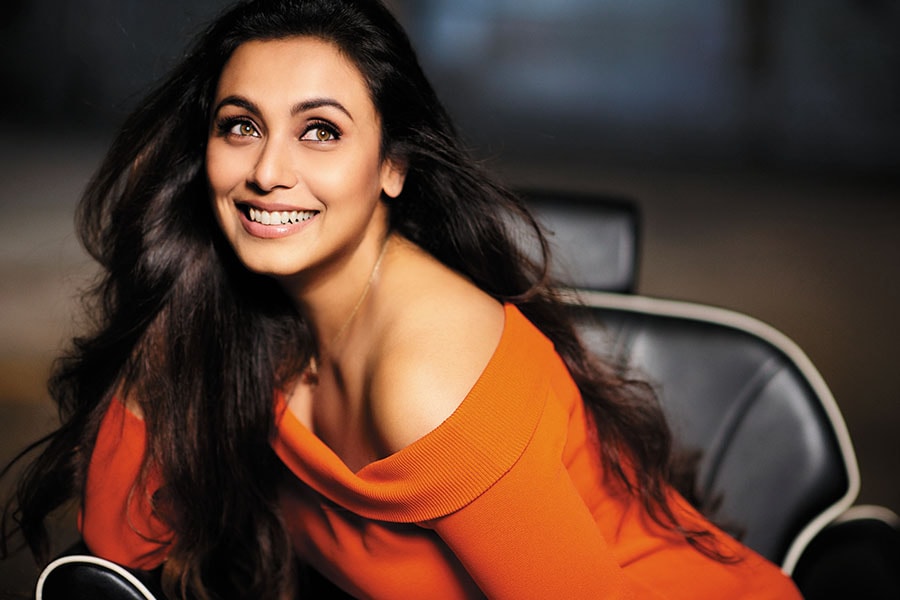 Image: Avinash Gowariker
Image: Avinash Gowariker Rani Mukerji is the centre of attention in the banquet hall of a five-star Mumbai hotel, where she is meeting the media. Fresh from the success of her latest release, Hichki, she is perched cross-legged on a chair, wearing her trademark smile that has won over moviegoers for more than two decades. The grin only gets wider as she speaks about Hichki, which released this March, and raked in Rs 45 crore in a month. “It’s a validation for an actor when a film succeeds, and the audience connects with it,” she says. “Hichki is a movie that people talk about in terms of being an inspirational one, something that will stay in their hearts for a long time. That has made its success even sweeter.”
Hichki is a tale of triumph of the underdog: Naina Mathur, a teacher with Tourette syndrome—a neuropsychiatric disorder characterised by the person emitting multiple peculiar sounds, often in the middle of completing a sentence—who brings about a positive change in the lives of a handful of underprivileged children. Made on a budget of Rs12 crore, it put 40-year-old Mukerji on the silver screen after a four-year hiatus, and garnered widespread praise from critics and audiences for Mukerji’s sensitive portrayal of Mathur.
Acclaim is not alien to Mukerji. She has got that in abundance from the time she brought freshness to the screen with films such as Kuch Kuch Hota Hai (1998) and Ghulam (1998) early in her career, to the instances when she pulled off complex roles such as in Saathiya (2002) and Black (2005). Despite that, the seasoned actor got the jitters when she went on the sets for the first time since her last outing on celluloid, Mardaani (2014).
“It was a bit frightening for me because I was really consumed with bringing up my daughter [Adira]. Plus there was the nervousness of whether people really want to see me back on screen… Have they moved on? There were several things running in my mind,” Mukerji says. “But when I faced the camera on the first day, I felt I belong here. As an actor, you truly never go anywhere. It [the craft] always stays with you.”
Hichki is a tale of triumph of the underdog: Naina Mathur, a teacher with Tourette syndrome—a neuropsychiatric disorder characterised by the person emitting multiple peculiar sounds, often in the middle of completing a sentence—who brings about a positive change in the lives of a handful of underprivileged children. Made on a budget of Rs12 crore, it put 40-year-old Mukerji on the silver screen after a four-year hiatus, and garnered widespread praise from critics and audiences for Mukerji’s sensitive portrayal of Mathur.
Acclaim is not alien to Mukerji. She has got that in abundance from the time she brought freshness to the screen with films such as Kuch Kuch Hota Hai (1998) and Ghulam (1998) early in her career, to the instances when she pulled off complex roles such as in Saathiya (2002) and Black (2005). Despite that, the seasoned actor got the jitters when she went on the sets for the first time since her last outing on celluloid, Mardaani (2014).
“It was a bit frightening for me because I was really consumed with bringing up my daughter [Adira]. Plus there was the nervousness of whether people really want to see me back on screen… Have they moved on? There were several things running in my mind,” Mukerji says. “But when I faced the camera on the first day, I felt I belong here. As an actor, you truly never go anywhere. It [the craft] always stays with you.”
***
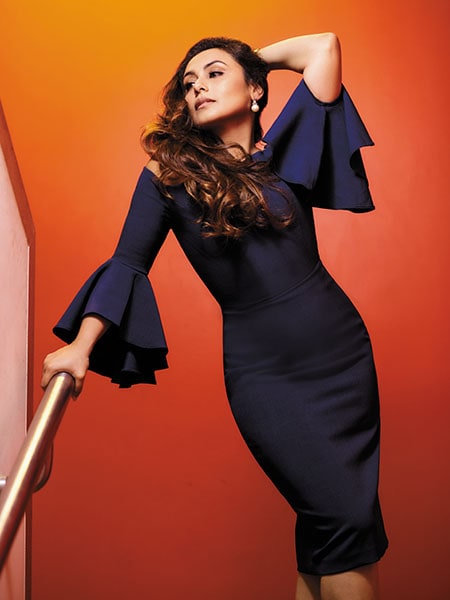
Image: Avinash Gowariker
For someone regarded as one of the best actors of her generation, acting wasn’t a preferred vocation when she started out. Over the years, however, Mukerji went on to master her skills to such an extent that she could easily absorb the nuances of the characters she played and effortlessly become that person on screen. “That was 22 years ago when I didn’t want to become an actor,” she laughs. “I have come a long way from then. I fell in love with my job after that. I love my craft. I love the fact that I am an actor and now I don’t think I could be anyone else but an actor.”
For Mukerji, daughter of the late filmmaker Ram Mukerji and playback singer Krishna, the process of understanding her craft is an emotional one, where she needs to feel connected with the character she plays. “Then I automatically become that person when the camera rolls. It’s a kind of a blessing that God has bestowed upon me, which I can’t explain in words,” she says. It also helps that she is a sensitive person who values her personal relationships. “You have to be a compassionate person yourself to be able to portray different kinds of emotions, and play diverse roles.”
Filmmakers concur, and believe it’s a trait that sets her apart from a lot of other actors. “There is an inherent goodness in Rani that connects with the public; she has a direct connect with audiences worldwide. It’s a rare thing for an actor to have, and she has it in a big way. That happens only when someone is honest and sincere to their craft. When a person is that sensitive, it comes across in their portrayal on screen,” says Kunal Kohli, who has directed Mukerji in Mujhse Dosti Karoge! (2002), Hum Tum (2004) and Thoda Pyaar Thoda Magic (2008).
Hichki director Siddharth P Malhotra calls Mukerji an instinctive and intelligent actor. “She’s an emotional and pragmatic person, and that helps. She’s seen life and knows better than most of us in terms of what to expect or what not to expect. As far as Hichki is concerned, she was aware that she was carrying the film on her shoulders. She knew the responsibility and she brought in all the power.”
For Mukerji, daughter of the late filmmaker Ram Mukerji and playback singer Krishna, the process of understanding her craft is an emotional one, where she needs to feel connected with the character she plays. “Then I automatically become that person when the camera rolls. It’s a kind of a blessing that God has bestowed upon me, which I can’t explain in words,” she says. It also helps that she is a sensitive person who values her personal relationships. “You have to be a compassionate person yourself to be able to portray different kinds of emotions, and play diverse roles.”
Filmmakers concur, and believe it’s a trait that sets her apart from a lot of other actors. “There is an inherent goodness in Rani that connects with the public; she has a direct connect with audiences worldwide. It’s a rare thing for an actor to have, and she has it in a big way. That happens only when someone is honest and sincere to their craft. When a person is that sensitive, it comes across in their portrayal on screen,” says Kunal Kohli, who has directed Mukerji in Mujhse Dosti Karoge! (2002), Hum Tum (2004) and Thoda Pyaar Thoda Magic (2008).
Hichki director Siddharth P Malhotra calls Mukerji an instinctive and intelligent actor. “She’s an emotional and pragmatic person, and that helps. She’s seen life and knows better than most of us in terms of what to expect or what not to expect. As far as Hichki is concerned, she was aware that she was carrying the film on her shoulders. She knew the responsibility and she brought in all the power.”
***
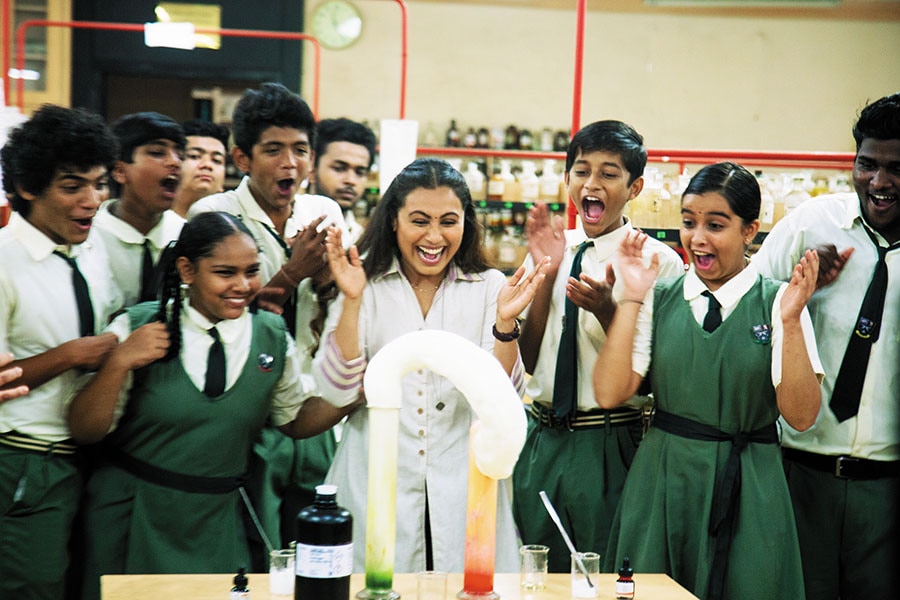 Rani Mukerji appeared on the silver screen after a four-year hiatus with Hichki
Rani Mukerji appeared on the silver screen after a four-year hiatus with Hichki As an actor, Mukerji believes her strength is that she brings real quality to her roles. As a result, people identify with her characters rather than with her as an individual. “So when they see my film, they don’t go to see Rani Mukerji, they go to see the character I am playing. And that’s what stays with them,” she says.
However, what the audiences see on 70 mm is the final product. What is not visible is the effort put in by actors behind the scenes. There’s a lot more that she brings to the sets than just prepping for her role. Director Pradeep Sarkar says Mukerji does her homework like a maniac and makes sure that the rest of the team is also as alert about things as she is. “This is obviously a person who is an old-timer, who knows the business, from where you get the light, to what kind of throw or pressure you need with your voice while delivering your lines. She’s a thorough actress from inside,” says Sarkar, who has worked with Mukerji in Laaga Chunari Mein Daag (2007) and Mardaani. In the latter, he adds, apart from the physical training that she underwent to play a cop, Mukerji knew by heart which scene she was coming from and which scene she was going into. “It helps the continuity factor, not just in terms of dressing and styling, but also the mood. You realise that when you are editing the film, and that’s why you need someone like Rani who is so fantastic.”
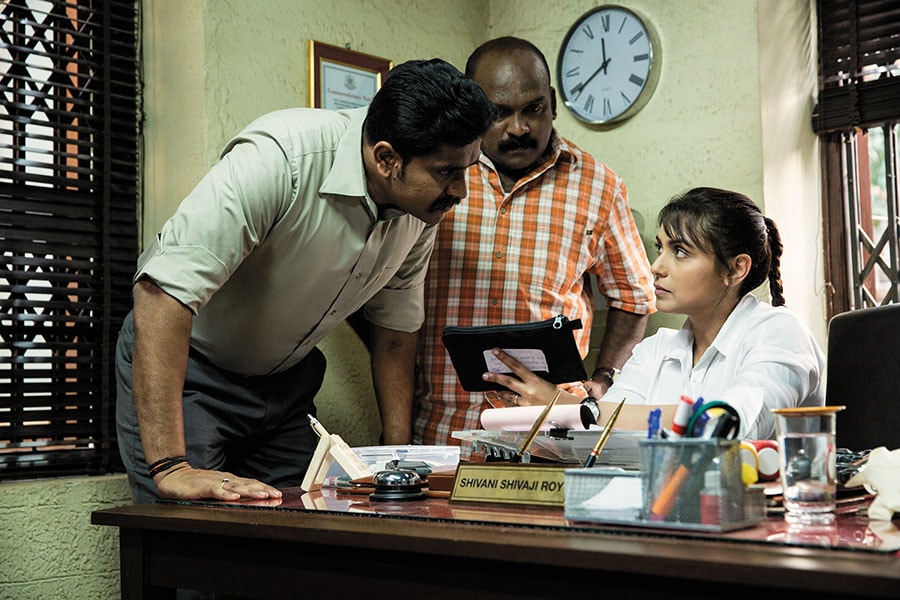
However, what the audiences see on 70 mm is the final product. What is not visible is the effort put in by actors behind the scenes. There’s a lot more that she brings to the sets than just prepping for her role. Director Pradeep Sarkar says Mukerji does her homework like a maniac and makes sure that the rest of the team is also as alert about things as she is. “This is obviously a person who is an old-timer, who knows the business, from where you get the light, to what kind of throw or pressure you need with your voice while delivering your lines. She’s a thorough actress from inside,” says Sarkar, who has worked with Mukerji in Laaga Chunari Mein Daag (2007) and Mardaani. In the latter, he adds, apart from the physical training that she underwent to play a cop, Mukerji knew by heart which scene she was coming from and which scene she was going into. “It helps the continuity factor, not just in terms of dressing and styling, but also the mood. You realise that when you are editing the film, and that’s why you need someone like Rani who is so fantastic.”

The actor created a niche for herself by taking on author-backed roles in films like Mardaani
Tahir Raj Bhasin, her co-star in Mardaani, remembers the first time he saw Mukerji on the film’s set. She was shooting a scene in which she talks to his character on the phone. “I saw her do this incredibly fierce speech with so much ease,” he recalls. “Pradeep Sarkar wanted to try out different variations and she did about seven takes back-to-back. It was incredible watching her perform like that. But, as an actor, there was pressure to up your game.” He is amazed at how easily she slipped in and out of character. “For a first-time actor, it was almost like being in an acting class on set.”
Mukerji, however, wears her stardom lightly. Her contemporaries say she is humble and works on making the film better, often handholding those who appear to be struggling. “She’s one of the nicest people you’ll meet. She’ll be there for you if you’re faltering and to course correct. She’s a team player; an actor who comes on set to learn and not be a star; someone who keeps the morale high,” says Malhotra.
During the shoot of the action scenes in Mardaani, when Bhasin felt a bit uncomfortable, Mukerji went up to him to calm his nerves. She told him it was like shooting a dance sequence, a partner game. And that he could rehearse whenever and as much as he wanted with her. “She treated me like an absolute equal and for a senior actor that was true stardom… to treat a newcomer like a star,” says Bhasin.
***
Mukerji, however, wears her stardom lightly. Her contemporaries say she is humble and works on making the film better, often handholding those who appear to be struggling. “She’s one of the nicest people you’ll meet. She’ll be there for you if you’re faltering and to course correct. She’s a team player; an actor who comes on set to learn and not be a star; someone who keeps the morale high,” says Malhotra.
During the shoot of the action scenes in Mardaani, when Bhasin felt a bit uncomfortable, Mukerji went up to him to calm his nerves. She told him it was like shooting a dance sequence, a partner game. And that he could rehearse whenever and as much as he wanted with her. “She treated me like an absolute equal and for a senior actor that was true stardom… to treat a newcomer like a star,” says Bhasin.
***
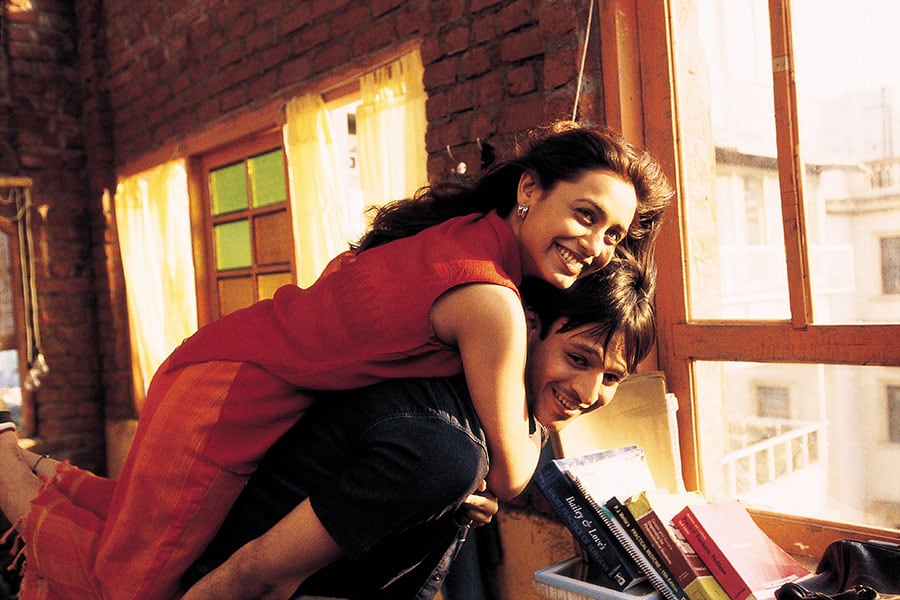 A still from Saathiya, one of her many hits
A still from Saathiya, one of her many hitsMukerji has proven her versatility over the years with an array of roles and sometimes, even by undergoing a transformation in the same film. In Kuch Kuch Hota Hai, for instance, she played a glamorous college girl before becoming the soul of the film by communicating with her daughter through letters. She showed her comic side in Bunty Aur Babli (2005) and Hum Tum, turned into an empathetic lawyer in Veer-Zaara (2004), and portrayed the angst of a blind and deaf-mute girl in Black. She not only overcame initial reservations about her husky voice and short frame, but also showed that someone with a pretty face can be a fine actor too. “It’s all because of the love from my audience. If they hadn’t liked my voice or appearance, I don’t think I’d be giving these interviews,” says Mukerji.
She is aware of her solid body of work, but says she can only try to make her characters as believable as possible. The fate of the film is not in her hands. “As actors, we can only give our best. At the end of the day, it’s a business where you are told how good you are on a Friday,” she concedes.
By ruling the roost for a large part of the two decades that she has been in the profession, Mukerji has busted a few myths associated with female leads: That they have a short shelf-life, and that they have to sacrifice their career for family. Hichki is her first film post motherhood, and the actor emphatically says that she will continue to act. “Acting is my life. I don’t think I would be the person I am if you take away Rani Mukerji, the actor. She completes me as a person,” says Mukerji.
The film industry believes it is her talent and dedication that have kept her on top of the game for so long. “What makes her not fade away is her constant belief that she is the best. When she’s ready for the character, she is the character,” says Sarkar. Kohli calls her a complete Hindi film heroine: “Rani is a rare talent that we are grateful to have had for so many years. I don’t think there is any role that Rani cannot do. She is a complete package of an actor and a star.”
Watching her perform is like magic, believes Bhasin. Even when there are no dialogues, she can communicate with ease. “Rani has these incredibly expressive eyes that can go from tender to fierce in a split second and that’s almost a superpower as an actor,” he says, adding that she has created a niche for herself with films like Mardaani and Hichki, “parts that only she can play”.
***
The limelight has rarely evaded Mukerji in all these years, and yet she has managed to keep the person separate from the star. Following her marriage to Yash Raj Films’ boss Aditya Chopra in 2014, and the birth of Adira in 2015, she has cut down on her public appearances. Her absence on social media means she remains even more elusive. In fact, it took her husband to remind her who she was and insist that she face the camera again with Hichki. “That made me realise I cannot forget my first family, which is my audience, because of whom I am who I am today,” says Mukerji.
Her peers, however, know her to be supportive and someone who brings a lot of cheer. “She’s a great friend. If she values you, she will be there for you. Such people are rare to find,” says Malhotra. “There’s happiness and laughter when she’s around. She’s entertaining too,” says Kohli, who hasn’t forgotten how she came to his residence with snacks to cheer him up after Mujhse Dosti Karoge! did not do well enough.
It is this human side to Mukerji that makes her endearing, more than all her award-winning performances. And she finds the goodwill and love that she has earned most fulfilling in her long career. “I am proud of the fact that I have garnered this kind of affection and duas [blessings] from my fans who love me, irrespective of whatever I am going through in life. It makes me emotional,” she says.
She is aware of her solid body of work, but says she can only try to make her characters as believable as possible. The fate of the film is not in her hands. “As actors, we can only give our best. At the end of the day, it’s a business where you are told how good you are on a Friday,” she concedes.
By ruling the roost for a large part of the two decades that she has been in the profession, Mukerji has busted a few myths associated with female leads: That they have a short shelf-life, and that they have to sacrifice their career for family. Hichki is her first film post motherhood, and the actor emphatically says that she will continue to act. “Acting is my life. I don’t think I would be the person I am if you take away Rani Mukerji, the actor. She completes me as a person,” says Mukerji.
The film industry believes it is her talent and dedication that have kept her on top of the game for so long. “What makes her not fade away is her constant belief that she is the best. When she’s ready for the character, she is the character,” says Sarkar. Kohli calls her a complete Hindi film heroine: “Rani is a rare talent that we are grateful to have had for so many years. I don’t think there is any role that Rani cannot do. She is a complete package of an actor and a star.”
Watching her perform is like magic, believes Bhasin. Even when there are no dialogues, she can communicate with ease. “Rani has these incredibly expressive eyes that can go from tender to fierce in a split second and that’s almost a superpower as an actor,” he says, adding that she has created a niche for herself with films like Mardaani and Hichki, “parts that only she can play”.
***
The limelight has rarely evaded Mukerji in all these years, and yet she has managed to keep the person separate from the star. Following her marriage to Yash Raj Films’ boss Aditya Chopra in 2014, and the birth of Adira in 2015, she has cut down on her public appearances. Her absence on social media means she remains even more elusive. In fact, it took her husband to remind her who she was and insist that she face the camera again with Hichki. “That made me realise I cannot forget my first family, which is my audience, because of whom I am who I am today,” says Mukerji.
Her peers, however, know her to be supportive and someone who brings a lot of cheer. “She’s a great friend. If she values you, she will be there for you. Such people are rare to find,” says Malhotra. “There’s happiness and laughter when she’s around. She’s entertaining too,” says Kohli, who hasn’t forgotten how she came to his residence with snacks to cheer him up after Mujhse Dosti Karoge! did not do well enough.
It is this human side to Mukerji that makes her endearing, more than all her award-winning performances. And she finds the goodwill and love that she has earned most fulfilling in her long career. “I am proud of the fact that I have garnered this kind of affection and duas [blessings] from my fans who love me, irrespective of whatever I am going through in life. It makes me emotional,” she says.
(This story appears in the 30 November, -0001 issue of Forbes India. To visit our Archives, click here.)
X





